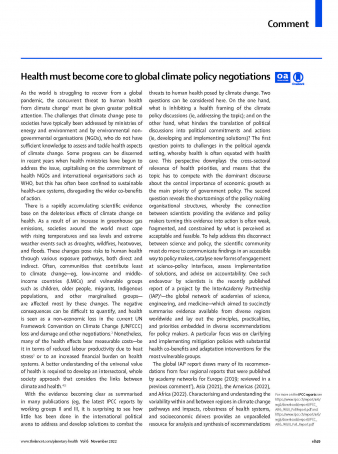As the world is struggling to recover from a global pandemic, the concurrent threat to human health from climate change must be given greater political attention. The challenges that climate change pose to societies have typically been addressed by ministries of energy and environment and by environmental non-governmental organisations (NGOs), who do not have sufficient knowledge to assess and tackle health aspects of climate change. Some progress can be discerned in recent years when health ministries have begun to address the issue, capitalising on the commitment of health NGOs and international organisations such as WHO, but this has often been confined to sustainable health-care systems, disregarding the wider co-benefits of action.
There is a rapidly accumulating scientific evidence base on the deleterious effects of climate change on health. As a result of an increase in greenhouse gas emissions, societies around the world must cope with rising temperatures and sea levels and extreme weather events such as droughts, wildfires, heatwaves, and floods. These changes pose risks to human health through various exposure pathways, both direct and indirect. Often, communities that contribute least to climate change—eg, low-income and middle-income countries (LMICs) and vulnerable groups such as children, older people, migrants, Indigenous populations, and other marginalised groups—are affected most by these changes. The negative consequences can be difficult to quantify, and health is seen as a non-economic loss in the current UN Framework Convention on Climate Change (UNFCCC) loss and damage and other negotiations. Nonetheless, many of the health effects bear measurable costs—be it in terms of reduced labour productivity due to heat stress3 or to an increased financial burden on health systems. A better understanding of the universal value of health is required to develop an intersectoral, whole society approach that considers the links between climate and health.

